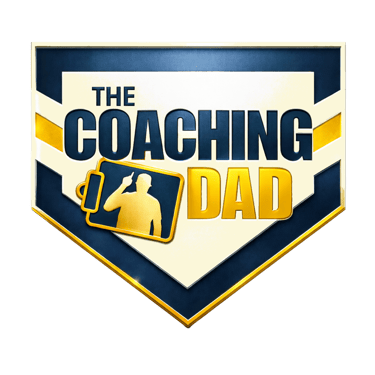Do Sports Enhance Critical Thinking?
Addressing the topic of whether sports provide mental conditioning as well as physical conditioning.
3 min read


Youth athletics offer far more than physical benefits; they are also an excellent platform for developing critical thinking and problem-solving skills. As a parent-coach, you have a unique opportunity to foster these essential cognitive abilities in your young athletes. Whether you are experienced or new to coaching, there are effective techniques and strategies you can implement to enhance these skills. This blog will explore how youth athletics can improve problem-solving and critical thinking, backed by research and practical tips.
The Cognitive Benefits of Youth Sports
Participation in youth sports is associated with numerous cognitive benefits. According to the American Psychological Association, sports participation can enhance cognitive functioning, including problem-solving, critical thinking, and decision-making skills (Reader's Digest). Moreover, a study published in the Journal of Sport and Exercise Psychology found that regular engagement in sports activities is linked to improved academic performance and higher levels of cognitive flexibility (TrueSport).
Techniques for Enhancing Problem-Solving and Critical Thinking
Encourage Strategic Thinking
Strategic thinking is a critical component of problem-solving. Sports such as soccer, basketball, and football require players to constantly assess the situation, anticipate the opponent's moves, and make quick decisions.
Game Simulations: Use game simulations during practice to help players think strategically. Create scenarios where they must decide the best course of action.
Tactical Drills: Incorporate drills that focus on tactics and strategy. Discuss different game strategies and encourage players to think about how to implement them.
Promote Team-Based Problem Solving
Team sports inherently involve collaborative problem-solving. Players must work together to overcome challenges and achieve common goals.
Group Discussions: Hold group discussions where players can talk through problems and come up with solutions together. This helps them learn to listen to others' perspectives and build on each other's ideas.
Team Challenges: Set up team challenges that require cooperation and collective problem-solving. For example, obstacle courses or scavenger hunts that require teamwork to complete.
Encourage Reflective Thinking
Reflective thinking helps players learn from their experiences, both successes and failures. This process is crucial for developing critical thinking skills.
Post-Game Analysis: After games or scrimmages, hold sessions where players can reflect on what went well and what didn’t. Encourage them to think about what they could do differently next time.
Personal Journals: Encourage players to keep journals where they can write about their experiences, challenges, and what they learned from them.
Develop Decision-Making Skills
Sports provide numerous opportunities for players to make decisions under pressure, which is a key aspect of critical thinking.
Decision-Making Drills: Incorporate drills that require players to make quick decisions. For example, in basketball, you could run a drill where players must decide whether to pass, dribble, or shoot based on the defensive setup.
Scenario-Based Practice: Create scenarios during practice where players must choose the best option. Discuss the outcomes of their decisions and what they might do differently.
Foster a Growth Mindset
A growth mindset, the belief that abilities can be developed through dedication and hard work, is essential for problem-solving and critical thinking.
Encourage Perseverance: Praise effort and perseverance, not just results. Emphasize that mistakes are learning opportunities.
Set Incremental Goals: Help players set incremental goals that challenge them to improve their skills progressively. This fosters resilience and a willingness to tackle complex problems.
Practical Tips for Parent-Coaches
Model Critical Thinking and Problem-Solving
As a coach, your behavior can significantly influence your players. Model critical thinking and problem-solving in your actions and decisions.
Think Aloud: Verbalize your thought process when making decisions during practice or games. This helps players understand how to approach problems logically.
Demonstrate Flexibility: Show that it’s okay to change tactics when something isn’t working. This teaches players the importance of adaptability and creative problem-solving.
Create a Supportive Environment
A supportive environment encourages players to take risks and think critically without fear of judgment.
Encourage Questions: Foster an environment where players feel comfortable asking questions and expressing their thoughts.
Celebrate Effort: Recognize and celebrate the effort and creative solutions, even if they don’t always lead to success.
Involve Parents
Engaging parents in the process can reinforce the development of critical thinking and problem-solving skills at home.
Parent Workshops: Organize workshops to educate parents on the importance of these skills and how they can support their development.
Regular Updates: Keep parents informed about what you’re working on with the team and how they can reinforce these lessons at home.
Supporting Research and Insights
Research underscores the cognitive benefits of youth sports. For example, a study by the Aspen Institute’s Project Play highlights that sports help children develop social, emotional, and cognitive skills that are critical for success in life (ActiveKids). Furthermore, the Positive Coaching Alliance emphasizes that sports can teach valuable life lessons, including teamwork, perseverance, and strategic thinking .
Conclusion
Youth athletics provide a fertile ground for developing problem-solving and critical thinking skills. By implementing strategic thinking drills, promoting team-based problem-solving, encouraging reflective thinking, developing decision-making skills, and fostering a growth mindset, parent-coaches can significantly enhance their players' cognitive abilities. Creating a supportive environment and involving parents in the process further reinforces these skills. With these strategies, young athletes can develop not only as players but as resilient, thoughtful individuals ready to tackle any challenge life throws their way.

